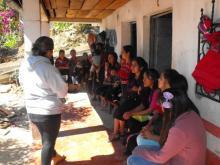UNV, together with UN Women and UNFPA, designed a project within the Saqilaj B'e Joint Programme to encourage indigenous adolescents to become leaders and acquire the necessary skills to actively participate in making decisions that affect their lives and impact their rights, and to prevent harmful practices against girls and adolescents in the regions of Huehuetenango and Totonicapán.
Three national UN Volunteers are working to empower adolescent girls by raising awareness amongst adolescents, their families and local authorities on women’s rights, and addressing issues such as early marriage, sexuality and violence against women. Their work contributes to the Saqilaj B’e Joint Programme (JP) implemented by UN Women, PAHO/WHO, UNESCO, UNFPA and UNICEF, together with the Government of Guatemala.
The project is especially important considering that Guatemala continues to be one of the countries with the highest incidence of poverty in Latin America and the Caribbean: 53.7 per cent of people live in poverty and 13.3 per cent live in extreme poverty, with 51.5 per cent of the population living in rural areas. Over 4,000 girls aged 10 to 14 give birth each year, and 748 women died a violent death in 2013. Ongoing efforts by the project promote the empowerment of indigenous adolescent girls, with a special emphasis on the prevention of teenage pregnancy and violence against women.
Raising awareness about women’s rights
The national UN Volunteers, together with UN Women and a local NGO working for youth development (Sociedad Civil para el Desarrollo de la Juventud), are helping develop strategic plans for the project and providing support in cases related to sexual abuse and violence against women. The volunteers also raise awareness about issues affecting women by organizing women’s participation in forums and events, and coordinating workshops for women and local authorities in different topics related to women’s empowerment – including legislation on women’s rights, early marriage, and violence against women.
Miriam Avila Villatoro is a national UN Volunteer serving with UNFPA and working together with an Association for the sustainable development of youth. She participates in workshops organized in indigenous communities to raise awareness about human rights amongst adolescents and their parents, facilitating intergenerational dialogues to share experiences and discuss what actions can be taken to reduce violence against women in the communities.
Talking about sexuality is often perceived as taboo in indigenous communities. Amongst other things, the workshops we organize have helped adolescent girls gain confidence to openly ask questions about various issues affecting them, and to be better informed about their rights.
Miriam Avila Villatoro
Since the launch of the project in 2016, the UN Volunteers have organized four community forums with 200 participants on violence prevention, teenage pregnancy, and child marriage; trained 50 adolescents and families on the National Plan for the prevention of unwanted pregnancies; supported the development of two networks for adolescents; held 16 workshops on Human Rights and reproductive health; and raised awareness among civil servants, including judges and police officers, on adolescent marriages and relevant legislation.
Moreover, 70 women, men and adolescents participated in the “End Violence Against Women” marches that took place in 2016 in Huehuetenango and Totonicapán.
Building local capacity
Women and adolescents have benefited directly from this project by receiving training on human rights and on development of life plans. Indirectly, these groups will benefit from the improved knowledge of judges and other officials, which will help strengthen government institutions and ensure better access to justice for women.
The UN Volunteers have worked closely with local partners to develop long-term strategic plans that will support the continuation of the work even after their assignments are over. Additionally, all three UN Volunteers have helped build alliances with local authorities, members of NGOs, and key community members that will help the local partners with their follow-up of the project.
The participation of local partners in the project activities has enabled them to strengthen their advocacy skills, enhance relations for future joint actions and increase their knowledge about women’s rights and gender equality issues in their communities.
In 2017, 29 UN Volunteers are serving in Guatemala with the United Nations Development Programme (UNDP), the Office of the United Nations High Commissioner for Human Rights (OHCHR), the United Nations Entity for Gender Equality and the Empowerment of Women (UN Women), the Office of the United Nations High Commissioner for Refugees (UNHCR) and the United Nations Population Fund (UNFPA).

